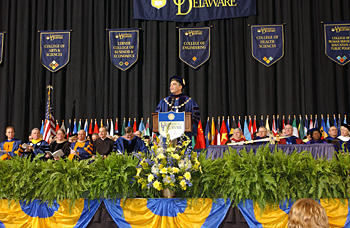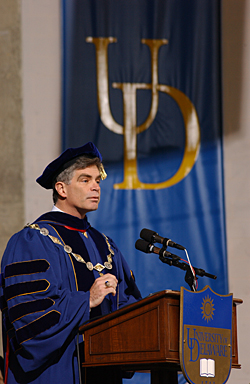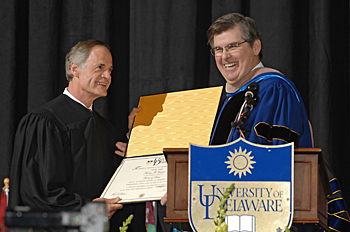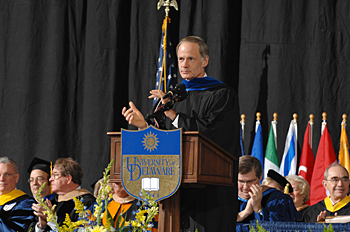
Harker made his remarks to an audience of more than 4,500, including family and friends of the newest members of the Class of 2007. The University conferred 146 doctoral degrees, 324 master's degrees, 843 bachelor's degrees and 70 associate's degrees on students who completed their degree requirements in August and December.
High-resolution video of Winter Commencement
Low-resolution video of Winter Commencement
Slide show of Winter Commencement 2008
Honorary degree citation for Thomas R. Carper
“What a great day of celebration!” Harker said. “I offer my hearty congratulations and encourage you to take pride in what you have accomplished here, because it is truly exemplary.”
In remarking that a UD degree is a credential that will define its recipients throughout their careers, Harker reminded the newest UD alumni to consider and continue the tradition of leadership established by the Rev. Dr. Francis Allison in 1743.
Alison founded the academy, which became the University of Delaware, and the very first class included three signers of the Declaration of Independence--one of whom also signed the Constitution, Harker noted.
“The tradition of excellence established in that first class has been handed down through the years as the University of Delaware has grown and evolved,” Harker said. “It has been cherished and nurtured, and now you are part of this great Delaware tradition that stretches back 265 years.”
While noting that members of the Class of 2007 are well prepared with skills, training and passion to play meaningful roles in society, he encouraged the gradates to seek meaning in their lives as they embark on the next phase of their academic and professional careers.
“Success is not an end in itself,” Harker said. “It is a means to an even higher and more noble end: a life well lived in service to mankind.”
The development of a meaningful life that includes service and leadership, Harker said, can be found in the words of academic and civil leader John Gardner, who said, “Meaning is not something that you stumble across, like the answer to a riddle or the prize in a treasure hunt. Meaning is something you build into your life.”

“By definition, leaders are not just in it for themselves. Leaders are in it for others,” Harker said. “Leaders are not defined by the authority they have, or the power they wield, but by the responsibility they take for those without authority, for those who have entrusted their well-being--through choice or circumstance--to others.”
A key component of leadership as envisioned by Francis Alison is that the responsibility of leadership is to create opportunity for others, Harker said.
“When we, as an institution, say that we seek to prepare you to become leaders, we mean that we want you to be men and women who will use the privilege of your education to help make a better society for the whole,” Harker said. “Your faculty, your fellow alumni and I have great confidence in you and in the potential of your leadership. We know you have the skills, and we believe you have the will to take on the important responsibilities that fall to you as heirs to the vision of Francis Alison.”
Faculty Senate President Alan Fox, associate professor of philosophy, told the new grads that he was "pleased to bring greetings on behalf of the Faculty Senate and to offer congratulations to the degree candidates on their accomplishments."
Carper, '75 MBA, who received an honorary doctor of laws degree from UD Board of Trustees Chairman Howard E. Cosgrove, thanked UD faculty members for helping prepare him for service in leadership roles at the state and national level.
“Not a week goes by that I don't put to practical use something that I learned as a graduate student here, so to all who taught me both in the classroom and outside of it, I thank you. I especially want to thank three of the most admired and revered professors to ever teach at this University, who I believe are somewhere in this audience. They are Drs. Jim Soles, Art Sloane and Don Puglisi. On behalf of a generation or two of UD students, 'God bless you.'”
After thanking family, friends, mentors and current and former staff members who have encouraged and supported him in his various leadership roles during a political career that includes a record 12 consecutive statewide elected positions in Delaware, including state treasurer and governor, U.S. representative and senator, Carper talked about giving back, seizing opportunities and providing service through leadership.
Carper noted the example of Charlie Plumb, a graduate of the U.S. Naval Academy and pilot who became a prisoner of war when his plane was shot down over Hanoi on May 19, 1967.
During a dinner in a New York City restaurant in the year following his release from a Viet Cong prison in 1973, Plumb recalled a stranger who approached him and asked him about the type of plane he flew during the war. This man even knew the day and year that Plumb's plane was shot down.

It was a conversation that Plumb could not get out of his mind, Carper said. “He began to reflect on the many other people in his life who had figuratively packed his parachute throughout his life--his parents, grandparents, aunts and uncles, teachers, coaches, other midshipmen, his squadron mates and his POW comrades--all of them people who had enriched his life--maybe even saved his life. And, with that realization came a resolution to start packing some parachutes for other people and to keep packing them for as long as the good Lord gives him life on this earth.”
Carper said individuals need to remember to thank those who have been packing parachutes for others by giving back through leadership and support roles.
“First, if you haven't already done it, start thanking some of the special people in you own life, particularly those who are here with you today. You know who they are. They do, too, and they'll appreciate it more than you know,” Carper said. “Second, if you're not already doing it, start packing some parachutes of your own this year, and keep packing them for as long as you live.”
In making the most of opportunities, Carper recalled inventor Thomas Edison, who said “Sometimes people miss out on opportunities because it comes along wearing overalls and is disguised and looks a lot like work.”
Carper also noted the observation of John Gardner, who spoke about great opportunities described as “'insolvable problems.”
“Both he [Garner] and Edison are right,” Carper said. “The challenge for this graduating class is to make the most of those opportunities. If you do, this state, this nation and our world will be better for it.”
America is facing an ever-increasing need for leaders at all levels and in all fields to meet some of its toughest challenges since becoming a nation, Carper said.
“Enlightened leadership is the key if we are to succeed and if you are to succeed,” Carper said. “I've been fortunate in my life to meet some of the best leaders that this country and this world have produced, and I've also me a few of the worst.”

“When things go well, good leaders give the credit to their team,” Carper said. “When things go badly, a good leader will take the blame.”
Such a leader, Carper noted, will attract others committed to excellence, something that can guarantee success while making the whole experience a fun experience.
“Be the kind of leader I've described, and if you are, and if you do these things, America and Americans will come a lot closer to realizing our true potential in the 21st century,” Carper said. “A lot of us are counting on you. So good luck and God bless. Now go out there and size the day. Carpe diem!”
The University of Delaware Chorale sang the national anthem and the alma mater at the ceremony, and the UD Graduate String Quartet provided music for the ceremony.
Article by Jerry Rhodes
Photos by Kathy Atkinson and Duane Perry

